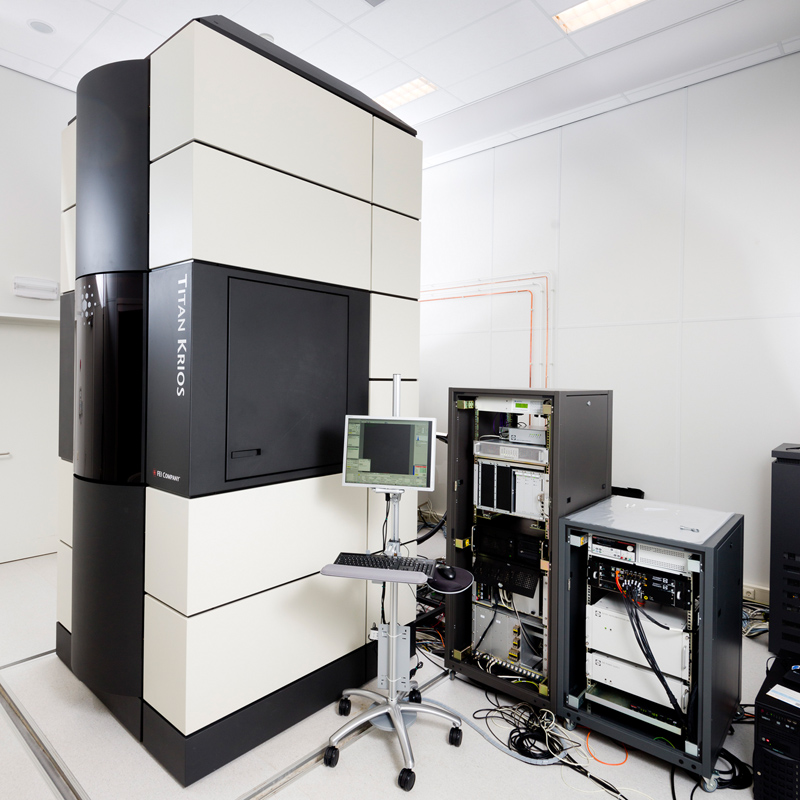
New management structure for nanoscopy centre NeCEN
A new executive board has been installed at NeCEN, a state-of-the art facility that offers the most advanced cryo-electron microscopes worldwide. The new board members are full of excitement: what are their ideas for the future of the facility?

Ariane Briegel and Meindert Lamers are the new co-directors of NeCEN. Briegel is Professor of Ultrastructural Biology at the Institute of Biology Leiden. Associate professor Meindert Lamers works at the Department Cell and Chemical Biology at Leiden University Medical Center (LUMC). As non-executive director, Professor Emeritus Jos Engelen (NIKHEF) will support the young team with his expertise as among others former chairman of the Dutch Research Council (NWO).
Briegel explains what NeCEN is about: ‘NeCEN is a state-of-the art cryo-electron microscopy facility that provides expertise in sample preparation, data collection, and subsequent processing. The facility houses several high-end instruments, including the only two Titan Krios microscopes in the Netherlands. We also want to educate novel users and bring in international scientists to present their cryo-EM related research, so the facility is also involved in training and seminars.’

Insights on atomic level
The facilities at NeCEN make it possible to have a look at the inside of cells. Lamers explains what NeCEN has to offer to scientists: ‘The high-end microscopes provide scientists with unprecedented high-resolution information on the intracellular organisation of cells, localisation of proteins, and even atomic three-dimensional structures of individual proteins. It is furthermore used in the field of material science to study the atomic structure of inorganic molecules. This information provides insight into how molecules work, how mutations cause disease, and aids in the design of new medicines.’

Increase impact
Physicist Jos Engelen elaborates on the future plans for the facility: ‘NeCEN was established in late 2011 and has been providing high-resolution cryo-EM data to hundreds of national and international researchers ever since. We are keen to expand the impact of NeCEN on science in The Netherlands, both by increasing the number of local users through collaboration and courses, as well as by providing more time and support to trained national electron microscopists. For this reason, NeCEN is also part of the Netherlands Electron Microscopy Infrastructure (NEMI). We will furthermore make sure that NeCEN remains a state-of-the-art facility, by implementing the latest technological advances and methodologies.’
New impulse
The Executive Board of NeCEN reports to the Supervisory Board, which consists of the deans of the Faculty of Science of Leiden University (Geert de Snoo, until 1 September 2019) and the Faculty of Medicine of the LUMC (Pancras Hogendoorn), the scientific director of the Institute of Biology Leiden (Gilles van Wezel), and the head of the Department of Chemical Immunology of LUMC (Jacques Neefjes). The Supervisory Board is very enthusiastic about the new impulse at NeCEN. De Snoo remarks on the importance of having this facility in Leiden: ‘NeCEN is a great facility in Leiden that allows researchers to do top research in the Netherlands. Only by working together do we have a research infrastructure like this available and can we participate on an international level.’ Hogendoorn is pleased to see another example of close cooperation between the LUMC and the Faculty of Science: ‘I am proud that with NeCEN we offer researchers from Leiden and far beyond a place to conduct excellent science. It is a wonderful example of how research from the LUMC and the Faculty of Science literally comes together.’
Header image by Georg Wolff, LUMC

NeCEN, the Netherlands Center for Electron Nanoscopy, is an international cryo-electron microscopy (cryo-EM) facility in Leiden that provides access to the most advanced electron microscope: the 300 kilo-electron volt (KeV) Titan Krios. It also offers sample preparation rooms, including one for biosafety level 2 pathogens such as for example the bacterium that causes cholera, or antibiotic resistant pathogens such as MRSA, and expert support by highly skilled staff. It furthermore houses a special sample preparation apparatus that uses a focused ion beam that allows researchers to cut out a thin slice of large specimens, such as a whole cell, in order to investigate its interior.
